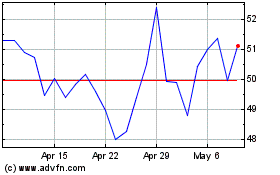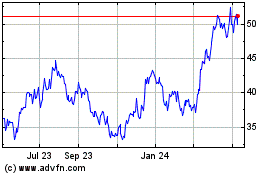By Sara Schonhardt
JAKARTA, Indonesia -- Freeport-McMoRan Inc., one of the world's
biggest copper miners, is heading toward a showdown with the
Indonesian government that is threatening global supply of the
metal and roiling the markets.
The Arizona-based company, whose majority-owned Grasberg copper
mine in Indonesia is the world's second largest, on Monday said it
wouldn't accept terms of a deal with the government that would
allow it to resume shipments of copper concentrate that have been
halted since Jan. 12.
The Indonesian government last Friday offered Freeport a new
one-year export permit, but only if it agreed to new rules
requiring it to build a new copper smelter in the country within
the next five years and switch to an operating license, the terms
of which dictate the company eventually would have to give up
control of Grasberg.
Freeport Chief Executive Richard Adkerson said the company was
unwilling to revisit the terms of its current 30-year contract to
mine at Grasberg, which accounts for about a third of Freeport's
annual copper production and 40%-50% of the value of its world-wide
assets. He said Freeport would consider going to arbitration if it
can't resolve the dispute within the next 120 days.
Its current contract allows for another extension up to 2041.
The company says it has been willing to compromise with the
government but requires certainty over its long-term operating
rights to make future investments.
"They're holding fast to the idea that for us to export we have
to accept forfeiting our [contract of work], and we're holding fast
to the position that we're unwilling to do that," Mr. Adkerson told
The Wall Street Journal.
Indonesia's minister of energy and mineral resources, Ignasius
Jonan, said the government also could bring Freeport to
arbitration.
"It's not just Freeport [that has such a right], the government
does too, " Mr. Jonan told reporters on the sidelines of an event
Monday.
The latest chapter in the standoff sent copper above $6,000 an
ounce on the London Metal Exchange, a nearly 1% increase, on
Monday. Prices of copper, one of the world's most highly traded
metals used in electrical cables and consumer goods, have risen 12%
this year, partly thanks to Freeport's problems at Grasberg. An
industrial dispute at the world's largest copper mine at Escondida
in Chile, part-owned by BHP Billiton PLC, also has pushed prices
higher.
Freeport's row in Indonesia comes as concerns grow about a rise
in protectionism globally, following U.S. President Donald Trump's
election victory in November. The trend is a particular concern for
mining companies, which rely heavily on smooth global trade flows
to get commodities from producing nations to consuming ones.
Without the cash generated from sales of copper concentrate
produced at Grasberg, Freeport could face a heavy hit to earnings
and its ability to invest elsewhere, including mines it is
developing in the U.S. southwest. Revenue from Freeport's Indonesia
operations was $3.3 billion in 2016, and it expects to generate
$5.9 billion this year if operations run normally.
The company sold $6.6 billion worth of mining and oil and gas
assets in 2016 to address debt issues, which Mr. Adkerson said had
put the company back on a "reasonable" financial footing.
"We need the financial support from Indonesia to invest in the
United States," Mr. Adkerson said. He said major shareholders such
as activist investor Carl Icahn were "very concerned" about the
company's problems in Indonesia.
Resource-rich Indonesia is a top producer of minerals such as
copper, tin and nickel. Under President Joko Widodo, the Southeast
Asian nation has sought to attract more foreign investment.
But while Mr. Widodo's government relaxed a three-year ban on
exports of nickel ore and bauxite earlier this year, Mr. Adkerson
said shifting policies had limited the country's ability to take
full advantage of its natural-resource wealth and discouraged
investment.
"We all want to see Indonesia succeed, but the policies they're
adopting for the mining business are flawed," he said. "And they're
flawed for them as well as for us."
Bambang Gatot Ariyono, director general of minerals and coal at
Indonesia's mining ministry, said the government couldn't allow
Freeport to disobey its new rules as they already had been
issued.
"We cannot run from this regulation," he said. "We have to find
a 'win-win' solution," he said, adding that the government didn't
want to bankrupt Freeport and remained in discussions with the
company.
Last week Freeport cut 10% of its expatriate workforce in
Indonesia, and Mr. Adkerson said it plans to start cutting contract
workers who account for around two-thirds of its 32,000 employees
in Papua, the eastern province where Grasberg is situated. On
Saturday the chief executive of Freeport's local subsidiary
resigned.
Freeport said in a statement Monday it expects its copper sales
to fall by 17% in the first quarter as a result of the impasse in
Indonesia, with gold sales down 59%.
Freeport said it has invested $12 billion in its mine in
Grasberg to date and has plans to invest an additional $15
billion.
A strike at the sole smelting facility where Freeport processes
around 40% of its output has added to production woes. Unable to
move copper concentrate off-site to be processed for export,
Freeport was forced to stop production at Grasberg and declare
force majeure earlier this month.
--Biman Mukherji in New Delhi contributed to this article.
Write to Sara Schonhardt at Sara.Schonhardt@wsj.com
(END) Dow Jones Newswires
February 20, 2017 11:13 ET (16:13 GMT)
Copyright (c) 2017 Dow Jones & Company, Inc.
Freeport McMoRan (NYSE:FCX)
Historical Stock Chart
From Mar 2024 to Apr 2024

Freeport McMoRan (NYSE:FCX)
Historical Stock Chart
From Apr 2023 to Apr 2024
